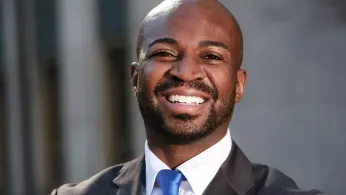
3 hours ago
Dakarai Larriett Breaks Barriers as Alabama’s First Out Gay Black Senate Candidate
READ TIME: 4 MIN.
Dakarai Larriett’s bid for the U.S. Senate in Alabama marks a watershed moment for both the state and the nation. At 43, Larriett stands poised to become the first Black out gay man elected to the Senate from Alabama, a state known for its entrenched Republican dominance and some of the country’s most restrictive anti-LGBTQ+ legislation. Rather than centering his identity in the campaign, Larriett insists his platform is fundamentally about improving people’s lives through pragmatic, inclusive policies .
“This campaign is so about the policies—the policies that improve the lives of people, and not the personalities,” Larriett emphasized in a recent interview .
Larriett’s story begins in Birmingham, Alabama, where his mother, a dedicated educator, fought to ensure he and his sister attended magnet schools rather than under-resourced local institutions. This early focus on education shaped his values and priorities. After graduating from the University of Alabama, Larriett found opportunities lacking at home, prompting a move to New York City. There, he built a career in supply chain management with global brands like L’Oréal, Whirlpool, and Louis Vuitton .
Larriett’s professional success was matched by a commitment to service. He served on the board of the Bronx Community Pride Center, advocating for unhoused LGBTQ+ youth, and worked with the National Harm Reduction Coalition to address the opioid epidemic. His leadership extended to the University of Alabama LGBT Alumni Association, reflecting a lifelong dedication to community empowerment and inclusion .
However, a pivotal moment came in 2024, when Larriett was wrongfully arrested by Michigan State Police. Exonerated after months of legal struggle, the experience highlighted for him the failures of government to protect its citizens, particularly marginalized communities. “I realized that government was not working for me, and I knew that it just was not working for other people,” Larriett said, recounting how this injustice motivated his shift to public service .
Democrats in Alabama have faced daunting odds in recent Senate races, often losing by significant margins. Larriett, however, is determined to redefine the playbook. In just two months since qualifying for the race, his campaign raised as much as previous Democratic nominee Rev. Will Boyd did over the entire campaign .
Larriett’s strategy centers on engaging young Black voters, collaborating with artists such as Birmingham-based rappers, and forging alliances with nontraditional groups across the state, including Quakers and Buddhists. “We’re building these coalitions all throughout the state that are very nontraditional,” Larriett explained. His goal is to boost Alabama’s historically low voter turnout, particularly in midterm elections .
Importantly, Larriett is not running a campaign centered on polarization or national personalities. “We don’t even talk about Trump because we’re focused on the issues, and we think that that’s an opportunity to gather those convertible votes. We don’t want people to feel badly about how they voted in the past, but we want them to do better,” he said .
Larriett’s campaign is built on three core pillars: education, health care, and economic opportunity. His education plan calls for raising per-pupil funding to national levels, increasing teacher pay, improving working conditions, and opposing voucher systems that redirect public resources. He credits his mother’s advocacy for his educational access and insists that every child deserves the same opportunities .
Healthcare is another central concern, with Larriett highlighting the need to address health care deserts and rural hospital closures, issues that disproportionately affect marginalized communities. He advocates for job training programs, investments in small businesses, and union support, arguing that economic opportunity must extend beyond corporate incentives to empower individuals and families .
“My state representative is an openly gay man, and so we have representation in government already, and that path has already been made,” Larriett noted, expressing optimism about Alabama’s capacity for progress. “I’m confident that Alabamians are going to choose the most qualified individual with the best résumé and track record of serving its people” .
Larriett’s candidacy is more than historic; it is emblematic of the ongoing fight for LGBTQ+ representation and inclusion in American politics. His platform, rooted in lived experience and sustained community service, reflects the potential for transformative leadership in places where progress has often been slow.
“I’ve done the work, and I continue to do the work. Twenty years of service on boards advocating for people, real people, for health care, education, and housing for all, and building something from the ground up. I get things done, and I’m quite effective, and it really is about serving the community,” Larriett stated. “It is a position of honor, but it is one of service” .
As Alabama’s Senate race unfolds, Larriett’s campaign stands as a testament to resilience and the power of representation. Whether or not he prevails in a state that has grown increasingly conservative, his run is already inspiring new conversations about inclusion, equity, and the future of LGBTQ+ leadership in American government.






